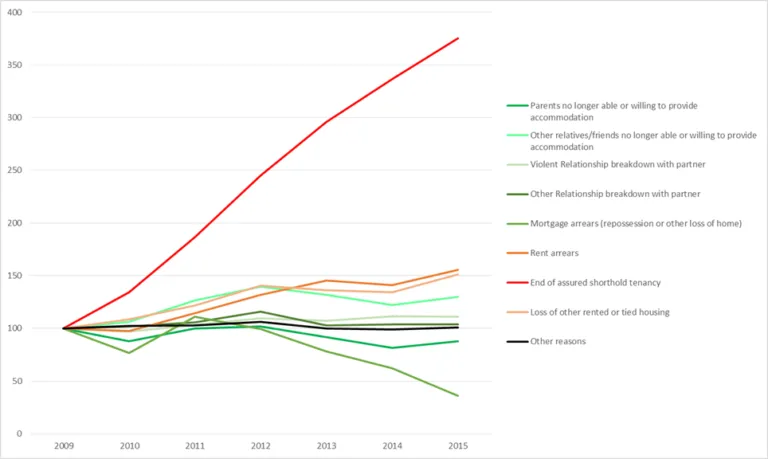Tools to tackle homelessness: What we’d like to see from the homelessness inquiry
Published: by Poppy Terry
A version of this blog first appeared on the Municipal Journal
Last week, Government Ministers appeared before the Communities and Local Government Select Committee to answer questions on what their departments are doing to tackle homelessness.
The evidence session was part of the current inquiry into homelessness, being undertaken by the CLG Select Committee. The first of its kind for ten years, this inquiry presents a valuable opportunity to take stock of what is driving homelessness in this country and what government can, and should, do to combat it.
So far, the inquiry has taken evidence from a wide range of sources – national charities (including Shelter), academics, local authorities and, importantly, people who have experienced homelessness themselves. Last week it was the turn of government ministers from the Department for Communities and Local Government and the Department of Health, and a representative from the Department for Work and Pensions.
It was encouraging to see representatives from different departments being questioned on the same day, and in the same session. The issues affecting homeless families, and the policies that can help to alleviate or resolve these, stretch right across government. As such, any successful national homelessness strategy will need to be cross-government and integrate the work of numerous departments.
But while it is for the government to lead on joined up work, addressing the fundamental problem of housing supply should be front and centre of their response.
As we outlined in our written evidence to the inquiry, the main causes of homelessness are failings in the housing system, namely a lack of stable, affordable and decent housing, and problems with access to accommodation. This is apparent in the main trigger of homelessness: the ending of a private tenancy. The government will need to focus on housing supply if it has any hope of truly tackling homelessness. Specifically, it will need to build many more homes of all tenure types, including those which are affordable to families on low and average incomes.

Triggers of homelessness
At the same time, the government will need to ensure that housing benefit adequately covers the shortfall between prices and incomes that currently exists. The affordability gap is ever-increasing and benefits aren’t sufficient – Local Housing Allowance had already fallen behind actual rents at the bottom of the market in nearly 70% of England last year. These benefits are key to helping families keep their homes while incomes and prices are out of step, and the government will need to adequately maintain this important lifeline.
This lack of housing supply is also driving the decisions and tying the hands of local authorities. In last Monday’s evidence session, ministers called out bad practice of local councils. While bad practice undoubtedly occurs, much of what we are currently seeing at a local level is the result of councils who find themselves under-resourced and without options.
One such example is the practice of placing homeless families in accommodation far away from their local area, from their schools, work and support networks. Of course the practice should be to house families locally, as Homelessness Minister Marcus Jones suggested last Monday. However, as our recent research shows, often councils simply don’t have this option. Councils need to be given the tools to tackle homelessness, which means money for prevention and access to affordable accommodation to house people in.
This will be particularly important if the government progresses with plans currently under discussion to change the statutory homelessness prevention duty. Legislative change around homelessness prevention in Wales and Scotland has prompted a conversation about the potential for similar changes here in England. At last Monday’s session, Marcus Jones said that while he feels there is merit in legislative change, he believes we should wait to see further evidence from Wales, over a longer period. On this, we wholeheartedly agree. While we are of course supportive of changes to legislation that reinforce genuine prevention and create better outcomes for all homeless households, it needs coupling with answers to the wider structural challenges. Housing supply and welfare reform will both need to be addressed if legislative change is going to be truly effective.
The remit of this inquiry is vast and the Committee’s job of condensing and rationalising the evidence is a daunting one. While there is so much to say, we’d particular like to see the Committee recommending a national-cross government strategy, which adequately addresses the fundamental problem of a lack of supply of affordable housing and acknowledges how detrimental welfare reforms have contributed to rising homelessness. Ideally, the recommendations would include the need for increased availability of social housing, alongside policies to improve the private rented sector, such as the extension of tenancy lengths to provide renters with more stability and to re-link housing benefit to the cost of housing.